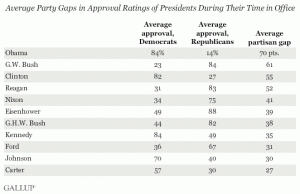In a post earlier this month, I referred to Obama as “the most divisive, hyper-partisan president since Nixon.” I was prepared for push-back from Democrats contending that the second George Bush was more divisive. The Iraq War certainly became divisive over time, but it started with broad bipartisan support. Of Obama’s biggest initiatives, Obamacare passed without a single Republican vote, and “Porkulus” had only a handful.
Now the nice folks at Gallup have provided polling data documenting just how divisive Obama has been (hat tip: Peter Wehner). Gallup headlines its article “Obama’s Fourth Year in Office Ties as Most Polarized Ever,” but to me, the most interesting data is in the chart reproduced above, showing the gap between Republican and Democratic approval rates averaged across the presidents’ entire incumbency. Obama’s average gap thus far is 70 points, on pace to shatter G.W.Bush’s prior record of 61 points. (Hm… 70 breaks a prior record of 61… where have I heard those numbers before?) Interestingly, Nixon, who stands out in my mind as a divisive leader, came in only fifth in Gallup’s rankings.
Gallup emphasizes the negative trajectory:
The trend toward increasingly partisan evaluations of presidents over time is also evident in the fact that no president before Ronald Reagan had more than a 41-point party gap in approval ratings, but four of the last five presidents (the exception is George H.W. Bush) have had better-than 50-point divisions in approval ratings by party.
So should we let Obama off the hook because of the historical accident of our highly partisan times? Naw. In 2008, Obama held himself up as a post-partisan beacon. But from the very beginning of his presidency, he has seemed intent on creating friction rather than reducing it. On his third day in office, he froze Republicans out of the Porkulus negotiations by telling them pointedly, “I won.” He went on to champion a healthcare package that was rammed through Congress in strict party-line votes — including votes scheduled for the middle of the night in the rush to pass the bill before people realized what was in it.
Recently, of course, we’ve had the Fiscal Cliff end-zone dance. That was followed by the inaugural address — a venue where presidents typically try to unite the country and soothe the passions stirred up by the recent campaign. But in his second inaugural, Obama turned up the heat. Michael Gerson summarizes the stridency:
Those who oppose this agenda, in Obama’s view, are not a very admirable lot. They evidently don’t want our wives, mothers and daughters to “earn a living equal to their efforts.†They would cause some citizens “to wait for hours to exercise the right to vote.†They mistake “absolutism for principle†and “substitute spectacle for politics†and “treat name-calling as reasoned debate.†They would have people’s “twilight years . . . spent in poverty†and ensure that the parents of disabled children have “nowhere to turn.†They would reserve freedom “for the lucky†and believe that Medicare and Social Security “sap our initiative,†and they see this as “a nation of takers.†They “deny the overwhelming judgment of science†on climate change, don’t want love to be “equal†and apparently contemplate “perpetual war.â€
The fruits of Obama’s antagonism will be harvested soon. With the debt ceiling kicked down the road again, the stage is set, as Newt Gingrich described, for battles over the sequester and the continuing resolution. The sequester’s draconian automatic spending cuts take effect March 1 unless Congress votes otherwise, and I expect House Republicans will be virtually unanimous in letting the cuts occur, unless they can win cuts of comparable size elsewhere from the Democrats.

